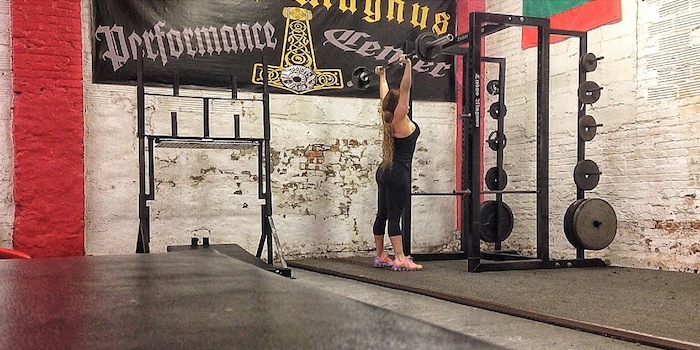
Background: I work at OSU as a graduate teaching associate and lift at Ludus Magnus. I am a raw lifter who competes in the 105lb weight classes, and am currently prepping for my next meet (when grad school finally gives me a weekend off) . Currently, I am in the process of trying to accomplish my lofty lifting goals,survive graduate school, and teach undergraduates about what I really love, TRAINING..
---
Concentric Block,Wk 1: DE upper (Sunday)
Warm up-general
1.Stepper
Warm up-specific
2a.lat pulldown, fat grip
3 x 15
2b. Push-ups
3 x 15
Neural prep
3. Plyo push-ups
3 x 3
Training
4. Speed contrast concentric only bench, no leg drive
8 x 3+1
1 set:
3 reps pin press x 50% at chest height
1 rep 30 lbs heavier
Assistance
5a. Overhead press
3 x 5
5b. Mb slam, overhead
3 x 5
6. Single arm db row
One set to failure no strap x 40lbs
*baby grip 🙁
Is adaptation always a good thing?
As I start into my concentric block, this though jumped into my mind many times during today's training session. The thought originated as a realized some of the weight I was using on the heavier single in my speed work (no leg drive) was weight that, at around this time last year, had been my max on concentric pin presses. Now, 12 months later, it is a weight, I can't' use to train maximal strength adaptions, but is instead one that needs to be used to train my rate of force development on my speed work.... Later, as a ran some errands and reflected on training, I couldn't shake this thought.
In training, we aim to adapt to a stimulus (normally load of weight on the bar), so that one day we will need to more weight if we hope to continue to make adaptations and get stronger (this is known as progressive overload). Thus, in some ways, training is about applying a stressor, adapting to the point where said stress is no longer actually a stressor, and apply more stress so we can continue to evolve and get stronger.
This concept of the general adaptation syndrome and progressive overload are not things just isolated to training in my opinion though. And soon my thoughts traveled to what this means in life.
In life we experience many "stressors", sometimes they painful and sometimes they are positive [stimuli]. But what happens overtime?
In the case of pain, if you are exposed to it (mental, physical, whatever) for long enough, you eventually become numb. The stressor was pain, and you adapt, so that whatever the pain was, no longer is. So, when you first bang your knee on that car door, it hurts, but no forever. Similarly, when you lose someone, it hurts, but not forever. On some level I can't help but thing it's because of the resiliency of the body to adapt to stress, that some people end up always seeking out more pain, more adrenaline rushes, or more self destruction.
On the flip side, what happens to a positive stimulus overtime, if there is no change? Take success at work, or the love of a family member, or hell love in general. Going with the 2nd example, a lot of times your family loves you unconditionally. However, when you are exposed to that wonderful thing all the time, it becomes something you expect as the bare minimum. Something some even take for granted. But it's not, and becoming almost "numb" to how amazing something like that is, is almost as detrimental to being numb to pain.
So, what is the point of this whole thought? To be honest, it come back to my original thought about the change in weight used when I first trained this morning: Sure, progressive overload is necessary for adaptations, but in that same light, it adaptations are not limited to training. They are applicable to life. And with that in mind, I think it is critical to reflect on what the effect of stressors, before containing to progressively overload.








